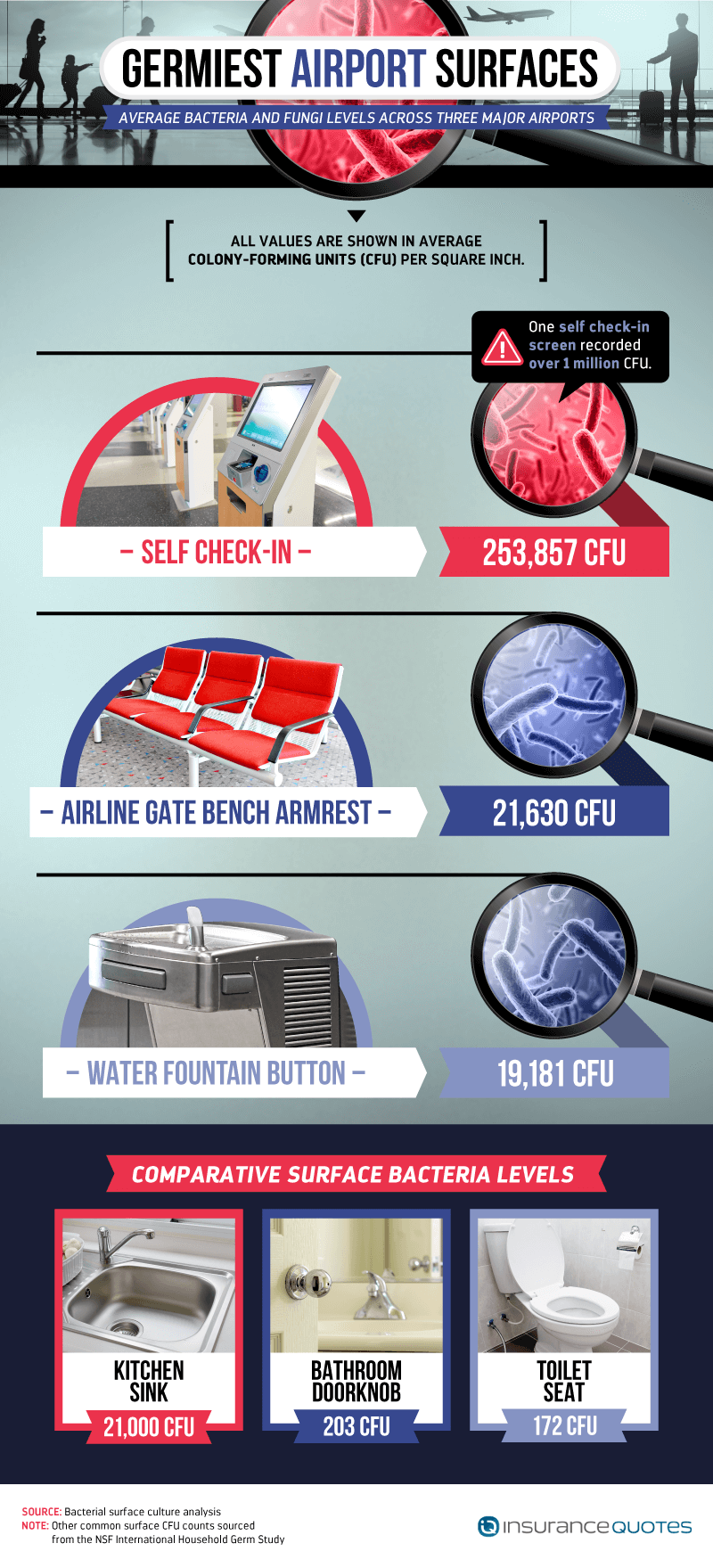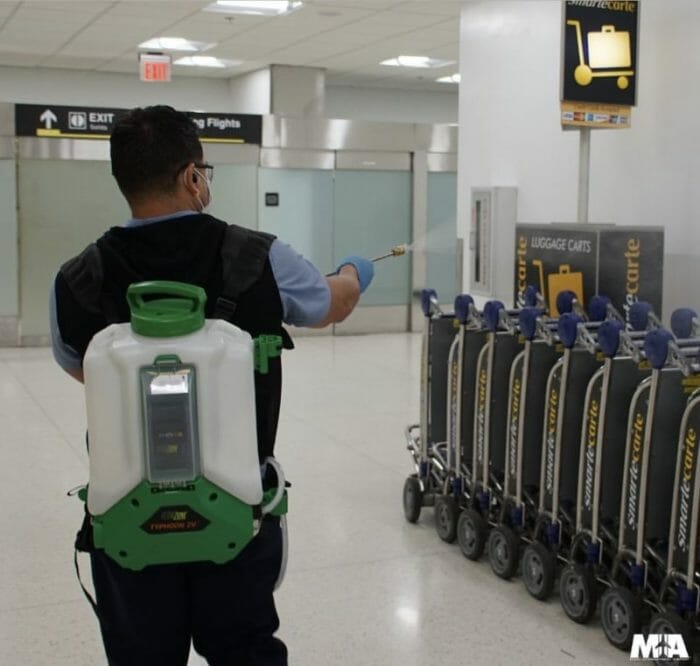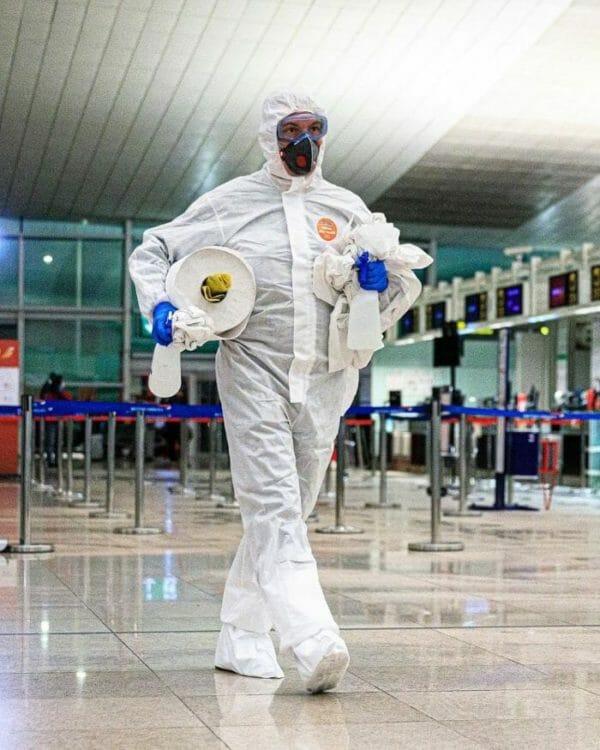Airports that have enhanced cleaning and sanitization protocols is a wellness initiative by the airport we like.
While the spread of the Coronavirus is prompting some people to rebook or cancel their flights, airports are ready for the passengers who do want to fly.
However, can you pick up the Covid-19 virus by touching surfaces contaminated at airports?
It is worth noting that, according to the Centers for Disease Control and Prevention, touching a surface or object with the virus and then touching one’s face” is not thought to be the primary way the virus spreads.”
A June 2018 study by InsuranceQuotes.com, found that the most pathogen ridden areas in an airport, are the touch screens of self-check terminals. The study of 15 different airports also found that bench armrests and water fountain controls were also more germ-ridden then the restroom surfaces.
Airports have now enhanced their cleaning and sanitization protocols to target high traffic surface areas.
RECOMMENDED: A Thorough Examination: 8 Medical Clinics At Airports In North America (UPDATED 2020)

You can check individual airports to see what they are doing but here is a glimpse of airports increased cleaning efforts and protocols
1. The www.nbcconnecticut.com website reports that “Bradley International Airport employees have increased how much they are cleaning and disinfecting with extra attention to restrooms, escalator handrails, elevators, and seating areas. There are also additional hand sanitizer stations throughout the terminal.”
2. Long Beach Airports, social media page says,
“Since we do not have international flights, Long Beach Airport is not experiencing any delays due to customs processing. We are open for business and our dedicated staff is cleaning and disinfecting on an hourly basis in order to protect the health and safety of our passengers and employees.”
3. High-traffic touch-points such as the arms of chairs, railings, lift buttons, doorknobs, touch screens, etc., are sanitized – manually – with a cloth and disinfectant are being cleaned “every 4 hours” at Bengaluru Airport reported the economictimes.indiatimes.com.
4. Toronto Pearsons website states that it has “added or enhanced cleaning procedures in conjunction and will continue to evolve these processes as needed.
5. Gatwick and Heathrow, Halifax Stanfield, Hartsfield-Jackson Atlanta International Airport, DFW Airport are all implementing “enhanced surface cleaning” in response to growing coronavirus fears.

More examples of how airports have increased cleaning efforts and protocols
6. Miami Airport is, “Making sure high “touch-point” areas such as handrails and elevator buttons are cleaned properly.”
7. Heathrow Airports website states that they have “…enhanced its already thorough cleaning processes in response to the issue including more frequent cleaning services scheduled and the provision of over 450 hand sanitiser dispenser locations across the airport.”
Ercan Airport,we are constantly implementing modern hygiene and cleaning procedures recommended by the International Air Transport Association and the World Health Org. to ensure the safety of all our airport employees and passengers. Health and Safety is our priority. pic.twitter.com/8C0wEC1V3F
— Ercan Havalimanı (@TTErcanAirport) March 20, 2020
8. Ercan Airport, are following enhanced cleaning procedures recommended by the International Air Transport Association and the World Health Org. to ensure the safety of airport employees and passengers.
9. PHL’s airport has a whole page dedicated to how they disinfect the airport. The airport provides that “custodial employees use a highly potent disinfectant, formulated for critical disease transfer points. The chemical, Envirox Critical Care, is known for its low toxicity and 24-hour residual bacterial killing abilities. Fun fact: this cleaner works in just 30 seconds!”
10. In a press release, SFO Airport states that “SFO Custodial staff is cleaning “common touched” areas twice daily with antibacterial cleaning solutions. SFO has procured a three-month advance supply of disinfectant, which is EPA-approved as an effective germicidal agent that kills all coronaviruses and is outlined in CDC recommendations for cleaning and disinfection.”
At @ChangiAirport, we care for your health & well-being. Watch how we’ve stepped up precautionary measures to keep the airport safe for staff, passengers and visitors, with these cleaning techniques and screening measures against the #COVID19 ⚔️ pic.twitter.com/FWNFH2etMT
— Changi Airport (@ChangiAirport) February 13, 2020
11. Changi Airport has created a short video so you can see the cleaning techniques and screening measures against the Coronavirus.

12. Members of the Spanish army “clean up” premises at Barcelona airport. Lots of media. They leave. After the performance, regular cleaning services at the airport do the real work.
RECOMMENDED: Coronavirus: What are airlines doing to handle the effects?
What products are airports cleaning with?
Airports that have enhanced their cleaning and sanitization protocols of high traffic touch-points can help reduce the spread of Covid-19.
However, what kind of disinfectants and sanitizers are they using and do they work? A big part of reducing the spread is not just the increase in cleaning, but the products airports are using.
Hand sanitizer everywhere
Despite the significant increase in hand sanitizers at airports, www.nbcnews.com website reported that GOJO, the maker of Purell hand sanitizer, is facing two class-action lawsuits accusing it of “misleading claims” that Purell can prevent “99.9 percent of illness-causing germs.”
The U.S. Food and Drug Administration (FDA) recently warned Purell against misrepresenting its hand sanitizer as being able to prevent viruses, without any adequate and well-controlled studies to support any clinical reduction in infection or disease of the flu or other microorganisms.
Also, Germ-X hand sanitizers are facing a complaint alleging Vi-Jon, Inc. has falsely advertised, marketed, and sold its Germ-X brand hand sanitizers as being able to prevent viruses, including COVID-19.
As hand sanitizing companies profit and make claims regarding the ability to prevent COVID-19, more lawsuits are likely to flow.
In the face of the Coronavirus, traveler and employee wellness is key and great to see airports doing their part.
